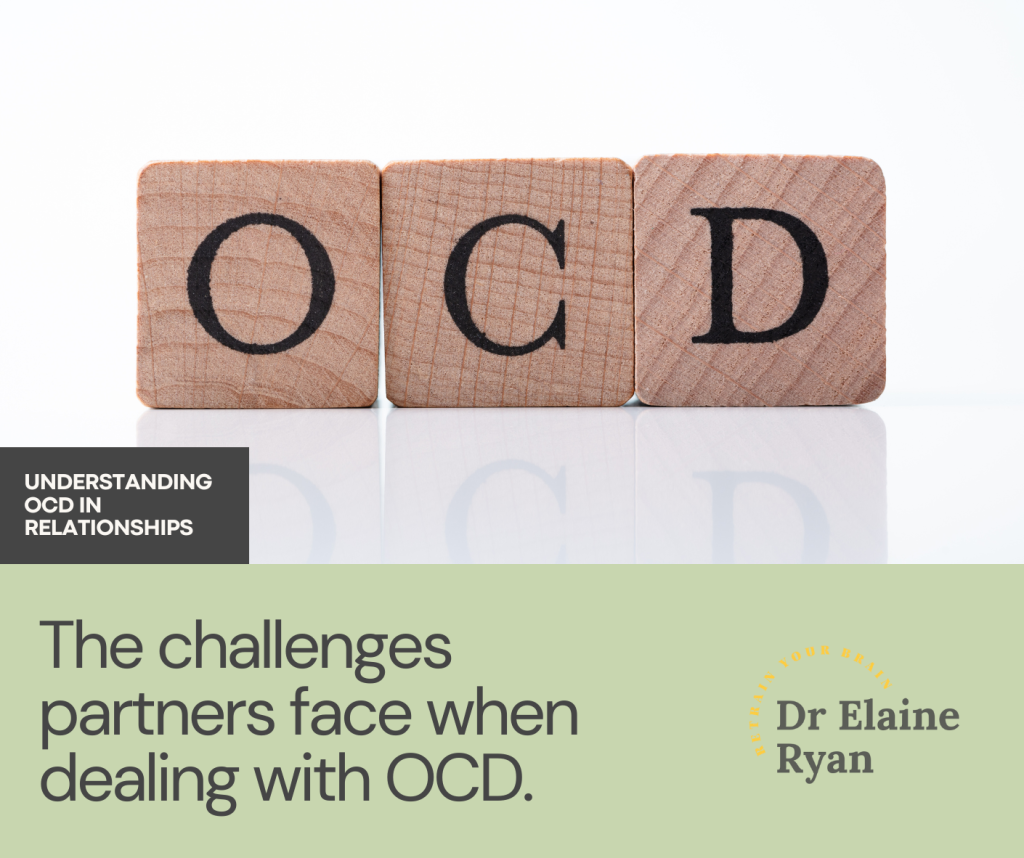I’ve written quite a bit lately on the subject of Relationship OCD, and today, I want to dedicate some time to talk about the impact ROCD can have on the partners of those who suffer from OCD.
ROCD is a form of Obsessive-Compulsive Disorder that focuses on intimate relationships and you can read more about it in-depth here. It’s characterized by intrusive thoughts, doubts, and compulsive behaviours related to one’s partner and the relationship. Like so many other mental health conditions, and indeed physical conditions, the impact of ROCD is not limited to the individual experiencing it. It also significantly affects their partners, often leading to emotional distress and relationship instability.
Understanding ROCD, its symptoms, and its impact is crucial for both individuals in the relationship. It’s the first step towards seeking help and managing the condition effectively.
In this article, we delve into the world of ROCD, exploring its impact on partners and providing insights into its recognition and management. Whether you’re a mental health professional, someone experiencing ROCD, or a partner affected by it, this article aims to offer a comprehensive understanding of the condition.

Understanding Relationship OCD
Relationship OCD, or ROCD, is a subtype of Obsessive-Compulsive Disorder. It’s characterized by obsessive doubts and compulsive behaviours centred around your relationship and partner.
Individuals with ROCD often find themselves caught in a cycle of obsessive thoughts and compulsive behaviours. These thoughts typically revolve around their partner’s suitability, their feelings towards their partner, or the “rightness” of the relationship.
Compulsive behaviours, as with all forms of OCD.are attempts to alleviate the distress caused by these obsessive thoughts. If you find yourself constantly seeking reassurance about your relationship, comparing your partner to others, or repeatedly analyzing past interactions, these are the compulsive behaviours (compulsions) that form part of OCD.
Here are some common symptoms of ROCD:
- Obsessive doubts about the relationship
- Constant need for reassurance
- Overanalyzing partner’s behaviors and words
- Comparing partner to others
- Fear of being in the wrong relationship
Defining Relationship OCD
ROCD is not simply having doubts or concerns about a relationship. It’s normal to have occasional doubts or to question the compatibility with your partner. However, ROCD is characterized by these doubts becoming obsessive, intrusive, and distressing.
These obsessions are often irrational and excessive, leading to significant distress and impairment in the individual’s life. They can consume a lot of time and energy, often interfering with the individual’s daily activities and overall quality of life.
Online self-help for ROCD
My self-help course contains everything you need to learn to get over Relationship OCD
Prevalence and Symptoms
The prevalence of ROCD in the general population is not well-established due to its relatively recent recognition as a distinct subtype of OCD. However, studies suggest that a significant proportion of individuals with OCD experience relationship-related obsessions and compulsions.
The symptoms of ROCD can vary widely among individuals. However, they generally revolve around themes of doubt, perfectionism, and the fear of making a wrong decision. These symptoms can cause significant distress and can negatively impact the individual’s relationship and overall well-being.
- Sarah and Tom’s Story: The Cycle of Reassurance Sarah, who has been diagnosed with ROCD, often finds herself questioning Tom’s feelings for her, despite his continuous expressions of love and commitment. Her constant need for reassurance has led Tom to feel overwhelmed and sometimes distant, fearing that his repeated affirmations are never enough. Their story illustrates how ROCD manifests in daily interactions and the emotional toll it takes on both partners.
- Jason’s Dilemma: Obsessive Comparisons Jason loves his partner deeply but is tormented by thoughts that he might find someone better suited for him. He spends hours on social media comparing his relationship to those of others, leading to distress and dissatisfaction.These compulsive behaviors disrupt intimate connections and personal peace.
- Mia and Ella: Navigating Intimacy and Attachment Issues Mia, affected by ROCD, doubts her feelings towards Ella, fearing that her love might not be genuine. These doubts prevent her from fully engaging in moments of closeness, causing both partners to feel isolated. Their story highlights the specific challenges in maintaining intimacy and emotional attachment in the shadow of ROCD.
The Psychological Impact on the Individual
The psychological impact of ROCD on the individual can be profound. The constant cycle of obsessive thoughts and compulsive behaviours can lead to significant distress and anxiety. This can interfere with the individual’s ability to function effectively in their daily life. You can read more about the challenges here.
Moreover, the individual may experience feelings of guilt and shame due to their obsessions and compulsions. They may also feel isolated and misunderstood, as they may find it difficult to explain their thoughts and behaviours to others. This can further exacerbate their distress and anxiety.
ROCD and Anxiety
Anxiety plays a significant role in ROCD. The obsessive thoughts that characterize ROCD often trigger intense anxiety in the individual. This anxiety then drives the compulsive behaviors, as the individual attempts to alleviate their distress.
However, these compulsive behaviours often only provide temporary relief. The obsessive thoughts soon return, leading to a vicious cycle of anxiety and compulsive behaviours. Over time, this cycle can lead to chronic anxiety and can significantly impair the individual’s quality of life.
The Emotional Toll on Partners
Partners of individuals with ROCD also experience significant emotional distress. They may feel confused and hurt by their partner’s obsessive doubts and compulsive behaviours. This can lead to feelings of insecurity and rejection, as they may question their partner’s love and commitment.
Moreover, partners may feel helpless and frustrated, as they may not know how to support their loved one. They may also feel emotionally drained, as dealing with ROCD can be exhausting and stressful. This can strain the relationship and lead to conflict and dissatisfaction.
Intimacy and Attachment Issues
ROCD can also impact intimacy and attachment in relationships. Obsessive doubts and compulsive behaviours can create a barrier to emotional and physical intimacy. This can lead to feelings of disconnection and loneliness in both partners.
Furthermore, ROCD can lead to attachment issues. The individual with ROCD may become overly dependent on their partner for reassurance and validation. This can create an unhealthy dynamic in the relationship, with the individual with ROCD constantly seeking reassurance and the partner feeling overwhelmed and burdened.
Recognizing and Addressing ROCD
Recognizing and addressing ROCD early in the relationship is crucial. It can prevent the escalation of symptoms and minimize the impact on the relationship. Awareness of the common symptoms of ROCD, such as obsessive doubts and compulsive behaviours, can help in early identification.
However, it’s important to distinguish between normal relationship doubts and ROCD. While it’s normal to have doubts and insecurities in a relationship, ROCD is characterized by persistent, intrusive doubts that cause significant distress and interfere with daily functioning.
The Role of Professional Diagnosis
A professional diagnosis is essential in managing ROCD. Mental health professionals can accurately diagnose ROCD and differentiate it from other relationship issues or mental health disorders. They can also provide a comprehensive treatment plan tailored to the individual’s needs.
Self-diagnosis through online resources or quizzes should not replace professional diagnosis. While these resources can provide preliminary insights, they have limitations and may not accurately capture the complexity of ROCD. Therefore, seeking professional help is crucial for effective management of ROCD.
Relationship OCD Quiz: A Preliminary Assessment
A relationship OCD quiz can serve as a preliminary assessment tool. It can help individuals recognize potential symptoms of ROCD and decide whether to seek professional help. However, it should not be used as a definitive diagnostic tool, as it cannot replace a professional diagnosis. You can take the test here.
Treatment Options and Managing ROCD
Effective management of ROCD involves a combination of treatment strategies. These include psychotherapy, medication, and lifestyle changes. The choice of treatment depends on the severity of symptoms, the individual’s preferences, and the impact of ROCD on the relationship.
Psychoeducation plays a crucial role in managing ROCD. It involves educating the individual and their partner about ROCD, its symptoms, and its impact on relationships. This understanding can help in managing expectations, setting boundaries, and developing effective coping strategies.
Cognitive Behavioural Therapy (CBT) and Medication
Cognitive Behavioural Therapy (CBT) is a highly effective treatment for ROCD. It involves identifying and challenging irrational thoughts and beliefs, and developing healthier thinking patterns. CBT can also help individuals manage anxiety and reduce compulsive behaviours associated with ROCD.
Medication, such as selective serotonin reuptake inhibitors (SSRIs), can also be used to manage ROCD symptoms. However, medication should be used in conjunction with psychotherapy for optimal results. The choice of medication should be made in consultation with a healthcare professional, considering the individual’s overall health and potential side effects.
Strategies for Partners
Partners play a crucial role in managing ROCD. Their understanding, patience, and support can significantly impact the individual’s recovery process. It’s important for partners to educate themselves about ROCD, its symptoms, and its impact on relationships.
Partners should also avoid enabling compulsive behaviours. Instead, they should encourage their loved ones to seek professional help and adhere to their treatment plan. It’s also important for partners to take care of their own mental health and seek support when needed.
Communication and Support
Open and honest communication is key in relationships affected by ROCD. Partners should discuss their feelings, concerns, and expectations without judgment or blame. This can help in building trust and understanding, and in managing ROCD symptoms effectively.
Support from partners can also include participating in therapy sessions, learning about ROCD, and implementing recommended strategies at home. It’s also important for partners to express empathy and understanding, and to reassure their loved ones that they are not alone in their struggle with ROCD.
Conclusion: Fostering Understanding and Support
In conclusion, Relationship OCD can pose significant challenges to both individuals and their partners. However, with understanding, support, and appropriate treatment, it is possible to manage ROCD effectively. It’s crucial to remember that ROCD is not a reflection of the individual’s character or their capacity to maintain a healthy relationship. With patience, empathy, and professional help, couples can navigate this journey together, fostering stronger bonds and deeper understanding.

